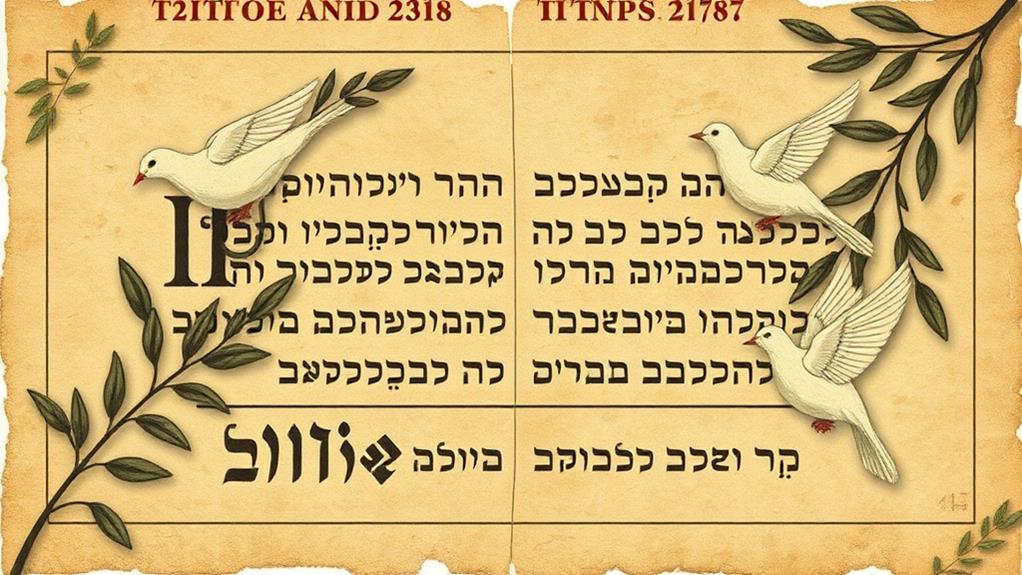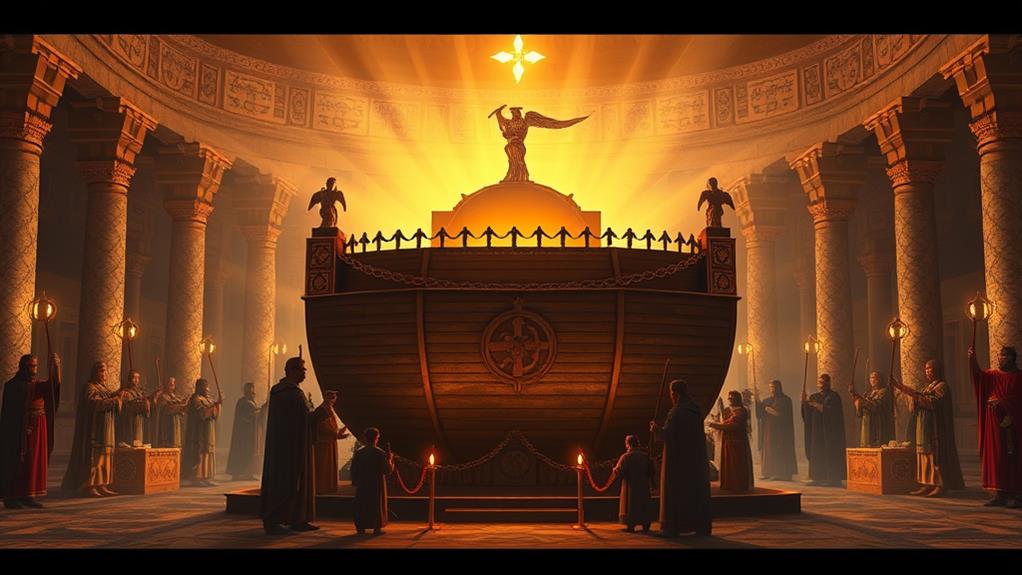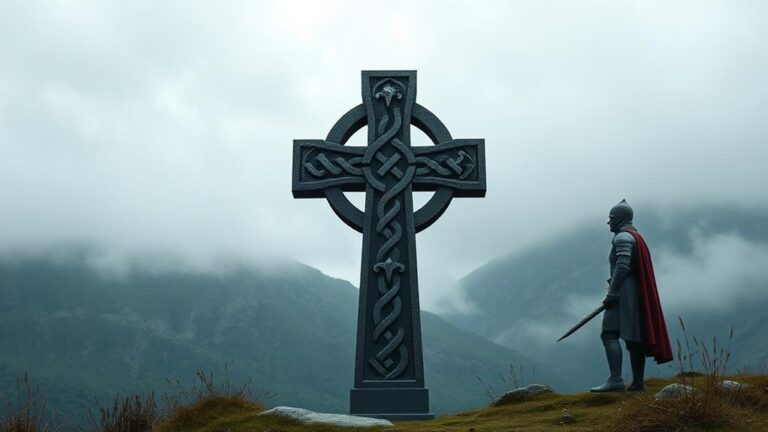Eleazar Name Meaning in the Bible
The name Eleazar in the Bible signifies “God has helped,” combining Hebrew elements “El” meaning “God” and “azar” meaning “helped.” This profound name symbolizes divine assistance and support, reflecting a deep spiritual commitment and obedience to God’s commandments. As a key figure in biblical narratives, Eleazar, the son of Aaron, exemplified devotion and faith as a high priest, playing pivotal roles in the division of Canaan and the succession of priestly duties. His legacy continued through his son Phinehas and descendants like Zadok, underscoring the significance of divine guidance and priestly tradition in biblical contexts, a theme that unfolds further in his extensive contributions to Israel’s spiritual history.
Key Takeaways
- Origin and Meaning: The name Eleazar originates from Hebrew “El” meaning “God” and “azar” meaning “helped”, conveying divine assistance and support.
- Biblical Figures: Prominent Eleazars include the son of Aaron, a high priest, and leaders in Israel’s spiritual history, symbolizing faith, courage, and spiritual stewardship.
- Spiritual Significance: Eleazar emphasizes divine assistance, guidance, and reliance on divine intervention, embodying themes of resilience, faith, and spiritual growth.
- Historical Context: Eleazar’s lineage continued through his son Phinehas, contributing to the priestly line, and his involvement in key events underscores his importance in the biblical narrative.
- Symbolic Representation: The name Eleazar represents spiritual leadership, adherence to divine instructions, and faith, reinforcing the spiritual significance of a strong religious foundation.
Origin and Meaning of Eleazar

The name Eleazar is frequently encountered in biblical texts, and its origin and meaning are rooted in Hebrew. The term “Eleazar” stems from two Hebrew components: “El,” which denotes “God,” and “azar,” which translates to “helped” or “has helped.” This composition yields a profound significance, conveying the divine assistance and support embodied by the name.
In biblical contexts, the name Eleazar resonates with themes of unwavering commitment and divine protection, reflecting a strong-willed guardian‘s qualities akin to those of William.
The meaning of Eleazar is “God has helped” or “Whom God helps,” emphasizing the protective and guiding role of the divine in the lives of those who bear this name. This symbolism is deeply entrenched in biblical narratives, where individuals named Eleazar, such as the son of Aaron and high priest after him, exemplify devotion and obedience to God’s commandments.
The origin of Eleazar is not only significant in its etymology but also in its historical and spiritual context. It underscores the central theme of divine assistance and the importance of faithfulness, highlighting the reciprocal relationship between God’s help and human obedience. This multifaceted meaning makes Eleazar a name rich in biblical symbolism and spiritual depth.
Biblical Figures With the Name
Biblical narratives feature multiple figures named Eleazar, each embodying the profound meaning of divine assistance inherent in the name. One of the most prominent Eleazars is the third son of Aaron, who succeeded his father as high priest and played a critical role in the Israelites’ spiritual leadership. His leadership qualities are highlighted in his oversight of the Levites and his charge over the tabernacle and its sacred vessels. The biblical parallels between Eleazar’s role and that of his father emphasize the importance of succession planning and spiritual significance, ensuring continuity in religious leadership.
Additionally, the name Eleazar carries themes of strength and resilience, resonating with the divine grace associated with its biblical roots.
Eleazar’s lineage continued to hold significant spiritual authority, with his descendants, including Phinehas and Zadok, serving as high priests and playing pivotal roles in Israel’s spiritual history. Other notable Eleazars include the son of Abinadab, who was entrusted with the care of the Ark of the Covenant, and a prominent warrior among David’s mighty men, who demonstrated remarkable bravery in battle. These figures collectively illustrate the enduring theme of divine assistance and spiritual leadership that underlies the name Eleazar.
Through their various roles and achievements, the name Eleazar becomes synonymous with faith, courage, and spiritual stewardship.
Spiritual Significance of Eleazar

An essential aspect of the name Eleazar lies in its spiritual significance, which is deeply intertwined with the concept of divine assistance and guidance. The name itself means “God has helped” or “Whom God helps,” emphasizing a profound reliance on divine intervention and support. This theme is repeatedly underscored in the biblical accounts of the various Eleazars, from the son of Aaron who served faithfully as a high priest to the individuals who played key roles in David’s army and in the restoration of sacred vessels after the Babylonian exile.
Moreover, much like the name Charlotte, Eleazar embodies themes of resilience and faith, encouraging individuals to embrace spiritual growth through the acknowledgment of God’s support in their lives, reflecting the Biblical values of strength and humility.
The spiritual symbolism of the name Eleazar highlights the importance of seeking and acknowledging God’s aid in all aspects of life. It serves as a reminder that human endeavors are strengthened and made successful by divine grace. The theological significance of the name resonates with religious connotations of trust, obedience, and servanthood.
In biblical interpretation, the name Eleazar stands as a statement to the enduring power and guidance of God, illustrating the critical role of faith in overcoming challenges and achieving purpose. This deeper understanding of the name Eleazar offers a compelling vision of a life grounded in spiritual dependency and divine assistance.
Historical Context of the Name
The historical significance of Eleazar extends beyond his individual role, embracing broader cultural interpretations and biblical connections. His lineage continued through his son Phinehas, contributing to the priestly line that would serve Israel for generations. Additionally, Eleazar’s involvement in key events, such as the division of Canaan and the purification of the sanctuary, underscores his importance in the biblical narrative (Numbers 34:17; Joshua 14:1; 19:51).
Understanding the historical context of Eleazar provides a rich insight into the biblical era’s religious and social dynamics.
Symbolic Representation in the Bible

Here are key aspects that highlight the symbolic representation of Eleazar:
- Divine Assistance: Eleazar’s name underscores the belief in divine intervention and support. As seen in the life of Eleazar, son of Aaron, who became the High Priest and played a pivotal role in maintaining God’s commands, the name symbolizes the reliance on God’s help and guidance. This concept resonates with the idea of responsible stewardship found in biblical teachings, emphasizing the importance of divine favor in leadership roles.
- Spiritual Leadership: The role of Eleazar as a high priest and his involvement in sacred rituals and decisions symbolize spiritual leadership and the importance of adhering to divine instructions. His responsibilities reflect the biblical ideals of servant-leadership, underscoring the necessity of humility and integrity in guiding others.
- Faith and Devotion: The various biblical figures named Eleazar, who demonstrated faith and devotion through their actions, represent the enduring spiritual connection and commitment to divine principles. This strong foundation of faith serves as an inspiration for subsequent generations, encouraging a life led by spiritual strength and courage.
This symbolic representation reinforces the spiritual significance of the name Eleazar, emphasizing a strong religious foundation and divine assistance in the lives of its bearers.
Eleazar in the Hebrew Tradition
In the Hebrew tradition, Eleazar, a name meaning “God has helped,” holds significant importance as it is borne by several notable figures in biblical history.
The most prominent Eleazar is the third son of Aaron, who succeeded his father as high priest and played an essential role in the religious and administrative affairs of the Israelites. His lineage continued through his son Phinehas, and the high priesthood remained in his family for several generations, underscoring the enduring legacy of Eleazar in Hebrew religious heritage.
Role in the Scriptures
Understanding the role of Eleazar in the Hebrew tradition involves examining his various appearances throughout the biblical narrative. Eleazar, the son of Aaron and the third high priest of Israel, played a significant role in the religious life of early Israel. His priestly lineage and the fulfillment of religious duties underscore his significance in the biblical narrative.
Key Roles of Eleazar in the Scriptures
- High Priest and Successor to Aaron
- Eleazar became high priest after Aaron’s death and succeeded him in leading the religious rites. He was entrusted with the tabernacle, its utensils, and the sacred duties, demonstrating his central role in Israel’s religious life.
- Leader and Support to Joshua
- Alongside Joshua, Eleazar was instrumental in the division of the land of Canaan among the tribes, showing his administrative and spiritual leadership. He also assisted Joshua in receiving divine guidance through the Urim.
- Spiritual and Administrative Leadership
- Eleazar’s oversight of the Levites and his role in important religious ceremonies, such as the sin offering and the purification of the censers, highlight his extensive responsibilities in Israel’s religious and administrative affairs.
Eleazar’s diverse roles underscore his pivotal position in the Hebrew tradition, emphasizing his dedication to the religious and administrative duties of Israel.
Historical Hebrew Context
The historical Hebrew setting of Eleazar‘s role is deeply embedded in the narrative of the early Israelite nation. In Hebrew customs, the name Eleazar signifies the direct intervention of God in the affairs of humans, emphasizing the theme of divine aid. Derived from the Hebrew words ‘el’ meaning ‘God’ and ‘azar’ meaning ‘to assist’, Eleazar reflects the cultural importance of trust and reliance on divine help.
The biblical account of Eleazar, especially the son of Aaron, highlights his pivotal role in the priestly lineage. Following the passing of his brothers Nadab and Abihu, Eleazar, along with Ithamar, was entrusted with the responsibilities of the high priesthood, underscoring his significance in maintaining the sanctity of the tabernacle. His tasks included supervising the Levites, managing the tabernacle, and mediating between the people and God.
This historical setting emphasizes the biblical relevance of Eleazar, presenting him as a symbol of divine guidance and a confirmation of the enduring tradition of priestly service in Israelite society. Eleazar’s legacy, ingrained in Hebrew customs, continues to prompt contemplation on the importance of divine aid and devoted service.
Eleazar’s Biblical Significance**
Biblical narratives center around Eleazar, whose name encapsulates the Hebrew tradition’s emphasis on divine aid. Eleazar, meaning “God has assisted” in Hebrew, exemplifies the recurring theme of divine intervention throughout the Hebrew Bible. His role as a priest and successor to Aaron underscores the symbolic representation of divine guidance and the historical importance of his lineage in the priestly tradition.
Key aspects of Eleazar’s biblical significance include:
- Successor to Aaron: Eleazar was appointed as high priest after Aaron’s passing, indicating the continuation of divine leadership and the priestly lineage (Numbers 20:25-29).
- Purification and Rituals: Eleazar played a vital role in the purification of the censers after Korah’s rebellion, highlighting the importance of rituals in maintaining divine favor (Numbers 16:37-39).
- Assistance to Joshua: Eleazar aided Joshua in the distribution of the land after the conquest of Canaan, demonstrating the collaboration between religious and political leaders in the Israelite society (Joshua 14:1; 19:51).
Through these roles, Eleazar’s life serves as a testimony to the intricate relationship between divine guidance, priestly duties, and the historical development of Israelite society.
The High Priesthood Legacy

The high priesthood heritage of Eleazar, the third son of Aaron, is a proof of the enduring influence of his lineage on Israel’s priestly tradition. Following the tragic deaths of his brothers Nadab and Abihu, Eleazar assumed a pivotal role, eventually succeeding his father Aaron and establishing a lineage that would hold the high priesthood for generations to come.
This heritage was marked by significant milestones, including:
- the distribution of land in Canaan
- the eventual restoration of the high priesthood to the family of Eleazar through Zadok.
Inheritance of Priesthood
Inheriting the priestly office from his father Aaron, Eleazar’s lineage played a pivotal role in shaping the high priesthood lineage in Israel. This divine inheritance marked the beginning of a lineage that would serve the Israelites for generations. The priestly lineage passing through Eleazar demonstrates God’s design for continuity and the importance of righteous leadership.
Key Aspects of Eleazar’s Priestly Lineage:
- Eleazar’s Appointment: After the death of his brothers Nadab and Abihu, Eleazar was appointed to oversee the sanctuary and the priestly duties, alongside his brother Ithamar (Numbers 3:4).
- Phinehas’ Succession: Eleazar’s son, Phinehas, also served with distinction and was granted a covenant of peace for his fervent zeal (Numbers 25:12-13).
- Enduring Legacy: The high priesthood remained in Eleazar’s family until the time of Eli, only to be restored later during the reign of King Solomon, underscoring the divine lineage’s resilience and enduring significance (1 Kings 2:35).
This lineage reflects a broader theme of divine inheritance, where God appoints and guides leaders to serve His people. Through Eleazar’s story, we see the importance of faithfulness, righteousness, and the legacy of divine leadership.
Aaron’s Succession Crisis
Moses transferred the sacred vestments to Eleazar on Mount Hor, symbolizing the official transfer of the high priesthood (Numbers 20:25-29). This marked the beginning of a long lineage of high priests descended from Eleazar, including Phinehas, who distinguished himself for his zeal and loyalty to the Lord.
The priestly lineage through Eleazar remained a cornerstone of the Israelite religious tradition, providing stability and continuity in the performance of sacred rites and rituals. Despite a temporary shift to the line of Ithamar during the time of Eli, the lineage returned to the descendants of Eleazar under Zadok, reinforcing the significance of this succession resolution in Israel’s religious history.
Enduring Legacy Established**
Rooted in a profound sense of continuity and tradition, the lineage of high priests descended from Eleazar underscored the lasting strength of Israel’s religious heritage. As a pivotal figure in the biblical narrative, Eleazar’s faithfulness and spiritual perseverance set a powerful precedent for future generations. His commitment to the high priestly office after succeeding his father Aaron secured the stability and continuity of Israel’s religious practices.
Key Aspects of Eleazar’s Enduring Legacy:
- Family Heritage: Eleazar’s lineage continued to hold the high priestly office for generations, emphasizing the importance of family heritage and tradition in maintaining spiritual continuity.
- Spiritual Endurance: Eleazar’s unwavering devotion and adherence to God’s commands exemplified the spiritual stamina required to lead the Israelites in their faith.
- Sacred Duties: As high priest, Eleazar oversaw the Levites, managed the tabernacle, and conducted sacred rituals, demonstrating the critical role of high priests in preserving Israel’s spiritual well-being.
This enduring legacy, built on spiritual perseverance and family heritage, underscored the significance of Eleazar’s lineage in upholding Israel’s religious traditions and consolidating its spiritual identity.
Notable Events Featuring Eleazar
What are the most significant events featuring Eleazar, a figure whose name embodies the assurance that God is a helper? Eleazar’s bravery is prominently highlighted in the account where he, along with King David, defied the Philistines at Pas Dammim. Despite the Israeli army’s retreat, Eleazar stood his ground, fighting valiantly until his hand grew tired and his grip froze onto the sword. This heroic act led to a great victory that day, with the troops returning only to strip the dead.
In contrast to this military valor, Eleazar, son of Aaron, is also remembered for his family loyalty and dedication to his priestly duties. He was instrumental in the consecration of the Levites and the distribution of land among the tribes.
His participation in the census and his role in the succession of the high priesthood, following his father’s death, underscore his commitment to his family’s spiritual legacy.
Eleazar’s diverse responsibilities and consistent adherence to divine instructions provide valuable lessons in leadership and faithful service. Through his life, we see the importance of courage, obedience, and the transmission of sacred responsibilities from one generation to the next.
Variations and Etymology Explained

The name Eleazar originates from the Hebrew language, where it is derived from two distinct elements: the word אל (‘el), meaning “God,” and the verb עזר (azar), meaning “to help.” This combination yields the name Eleazar, which fundamentally translates to “God has helped” or “Whom God helps,” highlighting the concept of divine assistance and support.
Key Variations and Interpretations:
- Linguistic Variations: Eleazar is known in various languages with distinct spellings, such as Lazare in French, Lazar in Russian, Lazaros in Greek, and Elazar in Hebrew. These variations reflect the cultural and linguistic diversity of the name.
- Cultural Interpretations: The name is deeply rooted in Jewish tradition, associated with several Biblical figures, including the son of Aaron and the nephew of Moses. It symbolizes divine aid and is a confirmation of the faith’s emphasis on divine intervention.
- Symbolic Meanings: The etymology underscores the concept of God as a source of help and support, making the name a powerful symbol of spiritual guidance and protection in various cultures.
Eleazar’s Role in Biblical Narratives**
Eleazar, whose name signifies “God has helped,” played a pivotal role in several key biblical narratives. He served as a high priest, a position inherited from his father Aaron, and was instrumental in fulfilling priestly duties such as managing the tabernacle and offering sacrifices on behalf of the Israelites.
His leadership and legacy are evident in his assistance to Moses, his oversight of the Levites, and his role in dividing the land of Canaan among the tribes of Israel.
Eleazar’s Priestly Duties
Eleazar, son of Aaron, holds a pivotal position in the biblical narrative, primarily due to his significant priestly responsibilities. Upon the untimely death of his brothers, Nadab and Abihu, Eleazar assumed additional duties alongside his brother Ithamar. His roles encompassed not only performing sacrifices and interceding for the people but also serving as a chief over the leaders of the Levites.
- Oversight of Tabernacle Duties: Eleazar was tasked with the supervision of the tabernacle’s articles, ensuring their sanctity and proper handling. This included managing the transportation of the ark, the altar, and the sanctuary’s fittings during the wilderness wanderings.
- Spiritual Leadership: He played a critical role in spiritual leadership, serving as a mediator between God and the Israelites. His involvement in the second census and the distribution of land further underscored his importance.
- Succession and Legacy: Upon Aaron’s death, Eleazar succeeded him as high priest, continuing in this office for more than twenty years. He assisted Joshua in governance and participated in key ceremonial duties, establishing a lasting legacy through his son Phinehas, who also served with distinction.
Key Biblical Events
Eleazar’s spiritual impact is evident in his participation in key events such as the census after the plague in the plains of Moab and the division of Canaan among the tribes. His dedication to the Lord and adherence to the divine commands set an enduring legacy.
This legacy was upheld through generations as his descendants, including Zadok, continued to serve as high priests, reinforcing the importance of Eleazar’s role in shaping the early Israelite religious and social fabric.
His commitment to God’s instructions and guidance played a pivotal role in establishing a strong foundation for the Israelite community, inspiring future generations with his unwavering faithfulness and spiritual leadership.
Leadership and Legacy**
The pivotal role of Aaron’s third son in the Israelite community is underscored by his involvement in several significant events that shaped the early religious and social fabric of the people. Eleazar’s leadership qualities and family legacy played a notable part in the spiritual development of the Israelites.
Eleazar’s leadership was marked by several key events:
- High Priesthood: Eleazar succeeded his father Aaron as high priest, assuming the vital role of spiritual leader and mediator between the Israelites and God.
- Conquest of Canaan: Alongside Joshua, Eleazar played an essential role in the division of the land among the Israelite tribes, demonstrating his administrative and spiritual leadership.
- Succession and Legacy: Eleazar’s family line maintained the high priesthood for several generations, culminating in the appointment of Zadok during King Solomon’s reign, thereby highlighting the enduring impact of his spiritual leadership.
Eleazar’s legacy extends beyond his immediate family, influencing future generations of spiritual leaders and shaping the religious practices of the Israelites. His commitment to God’s commandments and his role in significant events underscore his significance in biblical narratives.
Frequently Asked Questions
How Do You Pronounce the Name Eleazar Correctly?
The name Eleazar is pronounced as eh-lay-zar or eh-leh-ah-zar, with variations in phonetic pronunciation across cultures. Historically significant in the biblical context, its Hebrew origin means “God has helped,” emphasizing its enduring significance.
Is Eleazar Used as a Surname in Different Cultures?
Eleazar is used as a surname in various cultures, reflecting family heritage and cultural significance. It is prevalent in the Philippines and is also found in 54 countries, showcasing its global presence and diverse applications.
What Are Some Common Nicknames for the Name Eleazar?
The name Eleazar offers various popular nickname options, including Eli, El, Elie, Ely, and Zar, reflecting the cultural significance and versatility of this Hebrew origin name that emphasizes divine assistance and support.
Is There a Saint Named Eleazar in Any Christian Traditions?
In Christian traditions, there isn’t a universally recognized saint named Eleazar. However, Eleazar, son of Aaron, played a pivotal role in biblical levitical practices and is compared to other figures like Moses and Joshua, showcasing his faithfulness and obedience to God’s commands.
Does Eleazar Have a Specific Numerology Number Meaning?
Immerse in the vibrant tapestry of numerology, where Eleazar weaves a narrative of freedom and adventure. With a Destiny Number of 5, it symbolizes change, curiosity, and a thirst for new experiences.
Biblical Names of Strength and Faith
- Eleazar Name Meaning in the Bible
- Hannah Name Meaning in the Bible
- Huldah Name Meaning in the Bible
- Taliyah Name Meaning in the Bible
- Tristan Name Meaning in the Bible
Conclusion
The name Eleazar, derived from the Hebrew words for “God” (אל) and “to help” (עזר), symbolizes divine assistance and support. Throughout the Bible, eight men bear this name, including the son of Aaron, who succeeded his father as high priest and played a pivotal role in the Israelites’ journey, serving as a mediator and intercessor before God. This name’s legacy extends into various biblical narratives and historical contexts, emphasizing the importance of divine guidance and aid.






